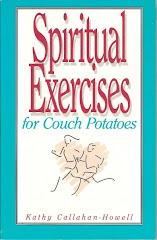When my husband and I first married almost 35 years ago, we
received as a wedding present a book that basically explained to wives how to
get husbands to do what you wanted. That’s the tactic many Christian women have
taken, loving manipulation.
We wondered how to address the unavoidable problem: if we
both submit, who has the tie breaking vote? In a traditional marriage, the
husband always does, even if he chooses the wife’s choice out of love and kindness.
But a truly equal marriage requires the possibility of another method, because
otherwise the decision making won’t truly be equal, which leads to manipulation
and bitterness from the wife.
I proposed the tie-breaking vote when required should come
from the person most affected. For example, in our marriage I provided the
primary child care, keeping our children and pastoring a church. I had primary
responsibility for Nora, Junia, Luke and Wesley, so any decisions regarding
their care would fall mostly on me. Roger would be consulted, but the burden of
driving Junia to eye therapy would be chiefly mine, so I needed to decide if I
was willing. He coached Luke at baseball and Wesley at swimming, so decisions
around those sports could favor his choices.
A particularly prime example occurred when a young man from
our church needed someplace to live while his mother entered treatment for
addiction. He had reached out to my husband, who felt a strong sense of
compassion and concern and automatically wanted to take him in. I cared too,
but I also saw the implications of taking an older male into my home at the
risk of my daughters, and knew that careful supervision would be required.
Although my husband would be home in the evenings and able to help and mentor
the young man, the majority of the burden of the added responsibility would
fall on me. So my approval mattered the most. We did take him in, and at times
that definitely caused extra effort on my part.
When it comes to financial decisions, Roger often gets the
last word since he is the primary breadwinner and carries the responsibility
for supporting the rest of us. A funny example happened regarding our fourth
child. I had always wanted an even number of children, so once we had three,
four needed to follow. But Roger changed to a full-time ministry job that
included a drastic cut in pay, so taking on another child felt overwhelming. He
grudgingly relented. All our other pregnancies required many months to
conceive. During that first month, Roger already regretted agreeing, and I told
him we would not try again, as I wanted him fully on board. However we were
already pregnant, which we both took as God’s clear will that we had a fourth!
Although our marriage often looks traditional since Roger
has been the primary bread winner and I did the full-time child rearing, we
nonetheless made decisions out of egalitarian principles. Despite keeping my
children I also pastored a church throughout their years at home, having
planted a church before our first child.
For couples with a different configuration, the basic
principle remains, the person who is most affected should have a greater say,
which still never assumes the other person has no input. Ultimately the less
selfish both people are the smoother this moves along. If we are keeping score
and worried about who is winning, we are unlikely to come to mutually agreeable
conclusions. If instead we have the best interests of our spouse at heart, we
will be more likely to conclude a happy result.
As a pastor I have definitely seen this in couples I’ve
observed. Decisions happen more smoothly with mature, selfless individuals.
Those who are out to win and get their way typically lose instead, as their
attempts to manipulate the situation either backfire or cause resentment.
Certainly being honest and forthright matters too, if we don’t say what we
want, it’s hard for the other person to consider our desires. If we hide the
truth in the interest of reverse psychology or some other tactic, we often
sabotage trust. If we hide the truth out of a mistaken understanding of
selflessness, we rob the other person of the privilege of letting us have what
we really want. Marriage should be a joyful giving to one another, instead of a
battle to negotiate.
Now as the parent of grown children, I’m watching my
offspring navigate these waters. They are doing it better than I did, for which
I rejoice.





No comments:
Post a Comment